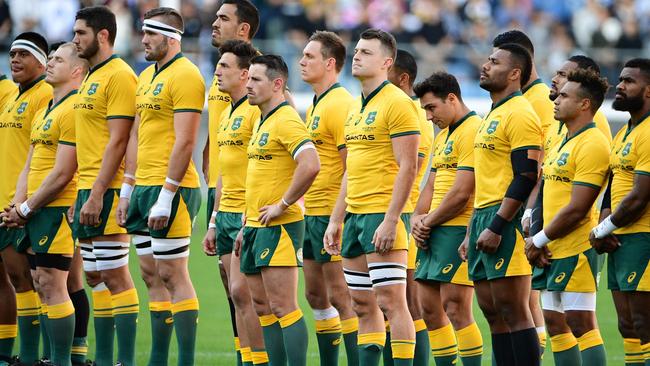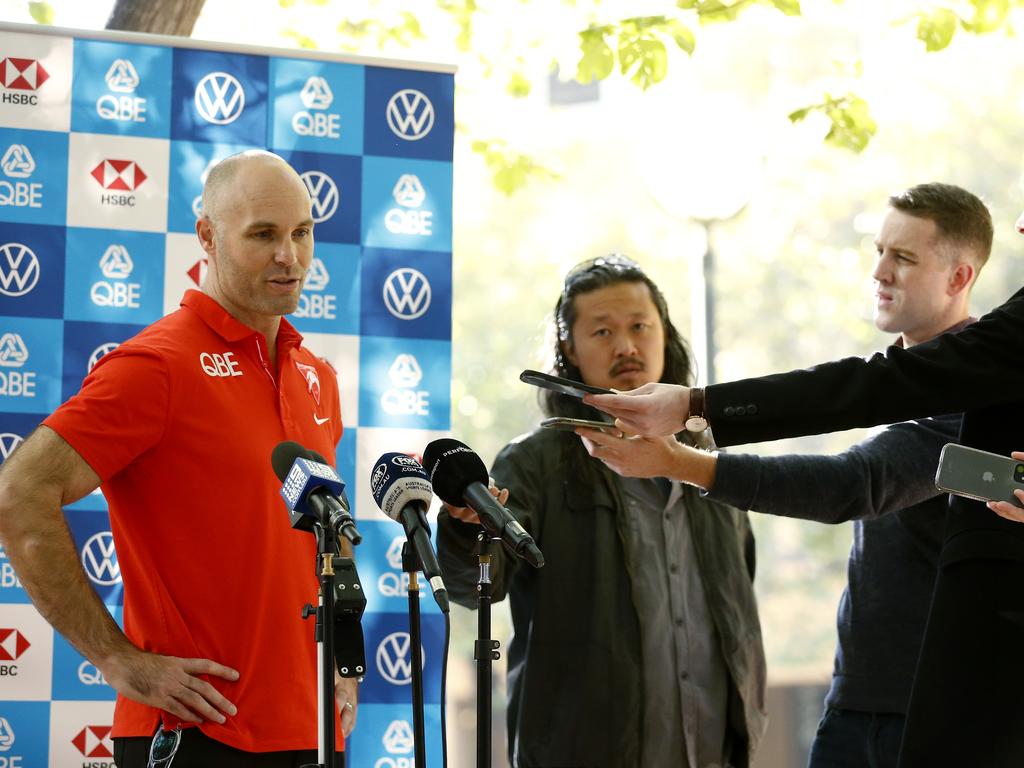Private equity aims to cash in on Wallabies, but is it a good deal
Rugby Australia looks set to follow New Zealand and European counterparts in taking outside money, but not all sports are looking to take the huge dollars on offer.

A slice of the iconic Wallabies jumper would be a vital source of revenue for global private equity corporations stalking rugby union, as the cash-strapped sport in Australia moves closer to clinching a deal for much needed investment.
Under terms being considered by Rugby Australia, the governing body would establish a third-party commercial entity that would control assets such as sales of Wallabies jerseys, sponsorship, broadcast deals, stadium contracts and other money-making ventures.
It could also sell a stake in Super Rugby clubs to private equity players, at least two of which are circling rugby union along with billionaire and Western Force backer Andrew Forrest. Such a deal could value rugby’s commercial assets at more than $1bn.
RA chairman Hamish McLennan said the Wallabies brand as a whole is not for sale – but they are considering selling a percentage of the right to promote the iconic Australian team.
“Obviously we have given a lot of thought to possible funding means, and feel that private equity is a genuine option that should be taken seriously,” McLennan told The Weekend Australian.
“It needs to be considered but in essence, the structure we will be selling is a small percentage of the right to promote the Wallabies brand – as opposed to the brand itself.”
“I am not being cute with my language and I understand the point, I have wrestled with that a great deal. No final decisions have been made. It could be we just sell part of a competition and not our other assets.”
McLennan’s comments come as dozens of sporting bodies across the world are contemplating private equity deals, ranging from Rugby New Zealand across the Tasman to professional fighting competitions and soccer leagues in Germany and Italy.
According to PitchBookData quoted by Sportico this week, private equity funds invested more than $10bn into US and European sports assets in the year to February – a 50 per cent increase over the previous 12 months.
Much of the money is coming in due to the sports suffering big revenue cuts during COVID-19. With no fans in the stands and competitions still being played, money to keep paying the bills is needed.
Meanwhile, debt is historically cheap and private equity firms are raising billions of dollars from investors. Sport, hugely popular but suffering through tough times, is seen as an undervalue asset that could be turned around for profit with some prudent investment and management over a few years: the classic private equity play.
Rugby Australia’s parlous finances are a major factor in its need for private equity, having recorded a $27m loss last year and being $30m in debt. And New Zealand Rugby also has balance sheet issues.
RA are looking at a number of options and could just sell a chunk of Super Rugby clubs and keep the Wallabies rights to themselves. McLennan said they look forward to discussing all this with the member unions that would vote on a proposal.
Rugby New Zealand has agreed to a 12.5 per cent sale in a new commercial entity for $NZ387.5m, though players have not signed off on the transaction as yet.
The RA hierarchy were due to meet with state and territory member groups on Thursday and Friday this week but the meeting had to be cancelled due to a COVID outbreak in Sydney. RA will meet with its stakeholders in a few weeks time.
Forrest has been in regular conversation with McLennan about investing in rugby – but he wants constitutional change and so does the RA chairman.
“Andrew Forrest is not going to write a blank cheque and give it to us,” McLennan said. “He and I are in violent agreement that any investment in rugby has to be tied to constitutional change.
“I would not take any money until I was confident it would be dispensed responsibly.”
Private equity outfits will demand a return from sport, and will be ruthless in attacking costs, says one executive who worked in sport that had private equity owners.
But private equity will also invest. Archer Capital paid $180m for about 65 per cent of the Supercars motor racing series exactly 10 years ago. Each team owner got $4m per car – Dick Johnson is said to have bought a new boat with his proceeds – but Archer also oversaw much-needed investments in digital assets, marketing and other income-generating ventures.
Archer still owns its share today. It has been unable to find a willing buyer and Archer’s Peter Wiggs has described Supercars as a “poor investment”, referring to a drop in broadcast rights, corporate sponsorship and a difficult market for ticket sales after the purchase.
Though Supercars still makes $20m or more in profits annually, potentially giving it extremely attractive profit margins of 30 per cent, it serves as a cautionary tale. Archer is stuck in racing without a clear exit.
Other deals have gone better for sports. Providence Equity Partners paid $US150m for a 25 per cent share of the US Soccer media and marketing arm Soccer United Marketing.
Major League Soccer was able to afford to buy back that stake five year later, and Providence tripled its money – a win/win outcome.
It has meant soccer in the US controls its own financial destiny again, and has the ability to choose another financial partner if needed.
It is also understood that one global rugby union body has inserted a “blacklist” of parties its private equity partner cannot sell its stake to in the future, in the hope it does not end up with a co-owner it doesn’t want.
“I don’t see (private equity) as a negative,” says billionaire Paul Lederer, who has experience with private equity in both business and sport. He sold 70 per cent of the Primo food empire to private equity in 2011 in a $740m deal, and together they sold the entire business for $1.45bn three years later.
Lederer says private equity typically will accept seven out of 10 deals being successful. Big sales make up for less spectacular ventures.
As chairman of A-league club Western Sydney Wanderers, he is involved in negotiations with potential private equity investment that could value the competition at between $250m and $400m.
“It gives you liquidity and cash injection,” Lederer said. “You’re able to get capital into the game, and due to COVID, sports need capital.
“Look, they are not going to hang around. They look for an exit in three to five years, probably three in the case of sport. So there is that uncertainty factor. But sport is undervalued now and if they can increase the value of it within a few years then everyone is happy.”
The Australian recently reported that the A-League would exchange up to 25 per cent of the privatised competition to private equity. Silver Lake, the same mooted partner for rugby union in New Zealand and potentially Australia, is said to be in the box seat. It paid $US500m for a stake in City Football Group, the owner of English giant Manchester City and Melbourne City. Powerbrokers from CFG are prominent in the ranks of Australian soccer administrators.
The soccer deal could involve funding for a broadcast service as well as some funds going to club owners who have lost tens of millions in recent years.
While soccer is desperate for cash to arrest sliding interest in the A-League, rugby league decided earlier this year it was not in immediate need for the money.
Australian Rugby League commissioner Gary Weiss, a respected business identity and long-time company director, was charged with investigating the merits of private equity for rugby league, including Oakwell Sports Advisory’s proposal to source funds of $200m or more.
Weiss says the NRL’s ability to get back on the field before most other sports last year and therefore keep much of its crucial broadcast income, led to it emerging from the worst of COVID in relatively good shape.
Rugby league posted a $24.7m loss last year, but would have only lost $3.7m had the end-of-season State of Origin been included in the accounts. It doesn’t need outside cash desperately.
But even Weiss says the sport would still consider taking in additional funds to help it grow, and certainly isn’t ruling out private equity.
“As our published results indicate, we came through the crisis in a position where we are not desperate for capital. We have no immediate requirement for capital to fund the game. That does not mean, however, that we would not be open to constructive proposals from capital providers to assist us to grow the game or to maximise the value of our commercial assets and revenue streams,” he told The Weekend Australian.
Weiss says the decision on whether to bring in outside funds will ultimately hinge on how much of a business a sport considers it needs to be – something that he concedes is a delicate balancing act.
“Not everything we do is driven by purely commercial outcomes. The (ARL Commission) is accountable to our members and other stakeholders in our game and we must always be mindful of outcomes that have their best interests considered.
“Nonetheless, commercial and financial considerations are clearly of significant importance to the commission. If the game’s finances are not in good shape it could materially compromise our ability to operate and grow rugby league in Australia and to participate in international competitions.”






